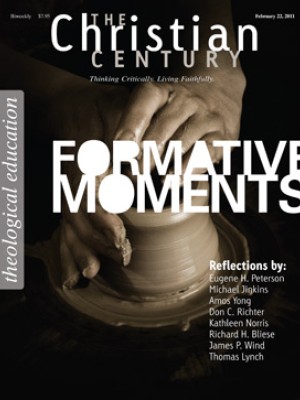What Matters? by Wendell Berry
When I first read Wendell Berry's 1985 essay "What Are People For?" 12 years ago, I was in college preparing to do exactly what Berry says that colleges prepare people to do—move to someplace that is not home and serve the economy. I read with academic disinterest his lament for the fate of the many "country people" who moved to cities and became unemployed.
Now I am a pastor, and after the economic collapse of 2008 many in my congregation are unemployed. So it was with renewed interest that I reread this essay, along with the 14 others (five new and nine previously published) that make up What Matters? Economics for a Renewed Commonwealth. However, my unemployed congregants aren't farmers who moved to the city; rather, they became victims of the economy we all serve. Writing with his usual clarity but with a less-hopeful-than-usual tone, Berry lays bare this economy's dehumanizing power.
Read our latest issue or browse back issues.
The main theme of the new essays will not surprise anyone familiar with Berry's work. In his view, there are two economies. One we know as "the economy." The fundamental purpose of this economy is to make products as cheaply as possible and to sell them as expensively as possible. "The economy" destroys what Berry calls the real economy—that of the household that is situated in the economy of the local community. It does so by exploiting the local community and the rest of creation in the quest for cheap labor and raw materials. The relationship between the two economies is the book's leitmotif.
As Berry performs variations on this theme, another theme can be heard that is the real gem of the book and the most immediately compelling—Berry's anthropology. In "What Are People For?" Berry offers this answer: people are for good work. In the book's new essays Berry expands that answer and responds to the standard political solution to unemployment: to create jobs and retrain people to work in a new economy.
What the standard political solution lacks, according to Berry, is any sense of the importance of vocation and place in its understanding of what people are for. "According to the industrial standard and point of view, persons are needed only when they perform a service valuable to an employer." This perspective ignores the fact that people might be needed for reasons other than economic ones, or that there might be a kind of work to which a person is uniquely suited, even called. Our reductive economy can't care about such things. In "the economy" people are interchangeable parts. What does it matter to this economy that people might be needed as neighbors and friends or that a person might need a particular kind of work?
Berry is not frequently theological, but his account of what people are for in the essay "Faustian Economics" tends toward the theological. He notes that "the economy" not only dismisses the importance of place and vocation in our calling as humans, it ignores human limits. It is predicated on the possibility of limitless growth and limitless acquisition, which "requires a doctrine of general human limitlessness." And a doctrine of human limitlessness is a theological mistake.
Our self-definition as limitless animals is a contradiction because any definition implies a limit, "which is why the God of Exodus refuses to define Himself: 'I am that I am.'" A limitless economy needs us to forget that we are creatures—and creation, a category without which Berry's work would be incomprehensible, is a theological category.
By now we are accustomed to Berry-influenced churches and Christians starting community gardens, promoting community-supported agriculture and engaging in other green initiatives. As we continue to suffer the aftereffects of the economic collapse, Berry's theological anthropology will also be important for churches to wrestle with.
These essays call us to go beyond the latest green fashions by engaging questions about human purpose—questions that churches should be uniquely qualified to ask and try to answer: Who are we? What are we for? What are our limits and how can we live creatively, even beautifully, within them?
It is possible that high unemployment will persist because many businesses used the slowdown as an opportunity to lay off people whom they had long wanted to replace with technology. So as the government tries to create new green jobs and train people for them, the rest of us are left to help the replaced people understand their dignity and value even without jobs. I'm thankful we have this book to help us.







